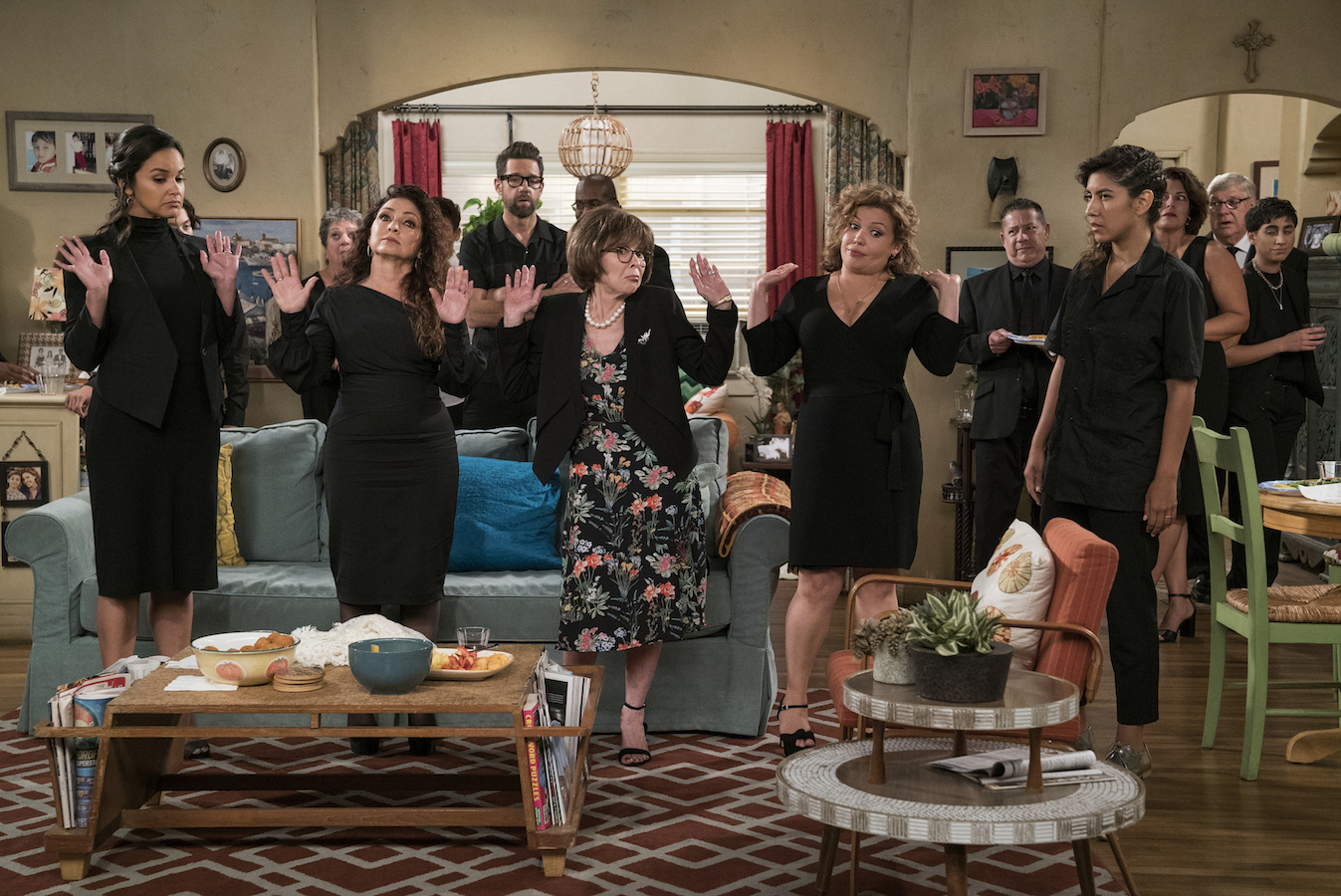The first season of Netflix’s One Day at a Time reboot announced itself as a hidden gem when it tackled head-on what it meant for a young Latina to come out to her family. Following Elena Alvarez (Isabella Gomez) over the course of the show’s three seasons has been a heartwarming journey. Her mother, brother, and grandmother were quick to support her even as her father famously stood her up at her quinces. Yet there’s been little talk about how her extended family felt about her coming out. That all changed in the first episode of the third season. As various family members gathered to pay respects to recently deceased Ophelia, Elena came face-to-face with a cousin she now suspects is gay.
Pilar (played by Brooklyn Nine-Nine‘s Stephanie Beatriz) has, we soon learn, all the tells of being a lesbian. They’re all outlined by Lydia (Rita Moreno) as proof she’s merely eccentric: She rides a motorcycle. She owns seven cats. She shares a one-bedroom apartment with her long-time roommate, Susan. “How is that gay?” Lydia wonders. Elena becomes convinced that her cousin is being kept in the closet by a family that decides to not talk about those things. “You know Pilar. She’s just like…” Penelope tells her daughter before putting her hands in the air in mock resignation. But once Elena and Pilar have a heart-to-heart about their respective experiences, it’s clear the show knows what it’s doing.
With Pilar’s brief arc on the show, not only is the sentimental sitcom poking fun at Latinx families’ tacit (if silent) approval of those who are, like Pilar and Elena, “you know…” but eager to show what different approaches to one’s sexuality can look like. Turns out this cousin wasn’t so much closeted as she was quietly coping with the fact that her family (and her mother) never quite believe she’s a lesbian. And that’s even after having attended her wedding to Susan (“That was a wedding?” an aunt asks). But, unlike Elena, who loves to wear her sexuality as a badge of pride, Pilar is okay with not paying attention to those viejitas.

“I know how being gay goes,” she tells Elena in Beatriz’s signature droll delivery. “When you first figure it out it’s like, ‘Oh, no, I might be gay.’ And then it’s like, ‘Oh, I’m gay.’ And then it’s like, gay, gay, gay! Rainbow underwear! But eventually, you realize you’re just a person, and it’s really empowering not to have to be defined by who you want to make out with.” It’s an eye-opening speech for Elena, because it’s both radical and conservative, utopian and old-fashioned in equal measure.
Not that Pilar has been the show’s only other lesbian. Judy Reyes, for example, plays Ramona, a fellow veteran who attends Penelope’s group therapy meetings. She’s outspoken about her own sexuality, even ditching Penelope for a woman she just met during a bachelorette party later in this new season. Slowly, the show has been offering various different ways to be and live as a queer woman. None is reduced to a stereotype. While most are femme-presenting (Pilar’s black guayabera and unfussy style notwithstanding), we’ve seen them paired with less feminine women as their partners: Ramona falls for a young woman (Nicole’s sister Mia) in a dapper suit with a buzzcut (played by staff writer Janine Brito) while Pilar’s butch wife is played by the show’s story editor and writer, Michelle Badillo.
These various other examples put into relief Elena’s individuality. Her zeal for activism (as well as for dorky puns about her “Syd-nificant other,” Syd, who identifies as nonbinary) is presented not as a requirement to be out and proud but as an aspect of her own personality. She may laud Pilar’s argument, calling her a Lesbian God, but the rest of the season’s stories about her show that Elena remains as staunch an LGBT activist as she’s always been. One Day at a Time doesn’t come down on Elena’s radical calls for visibility and acceptance, nor on Pilar’s more modest demands to think away her lesbian identity. Both characters understand the complexities of their own lives and act accordingly. This is what we gain when we refuse to let characters be tokens. Their identities don’t define them; they just inform their experience.
One Day at a Time is currently streaming on Netflix.







